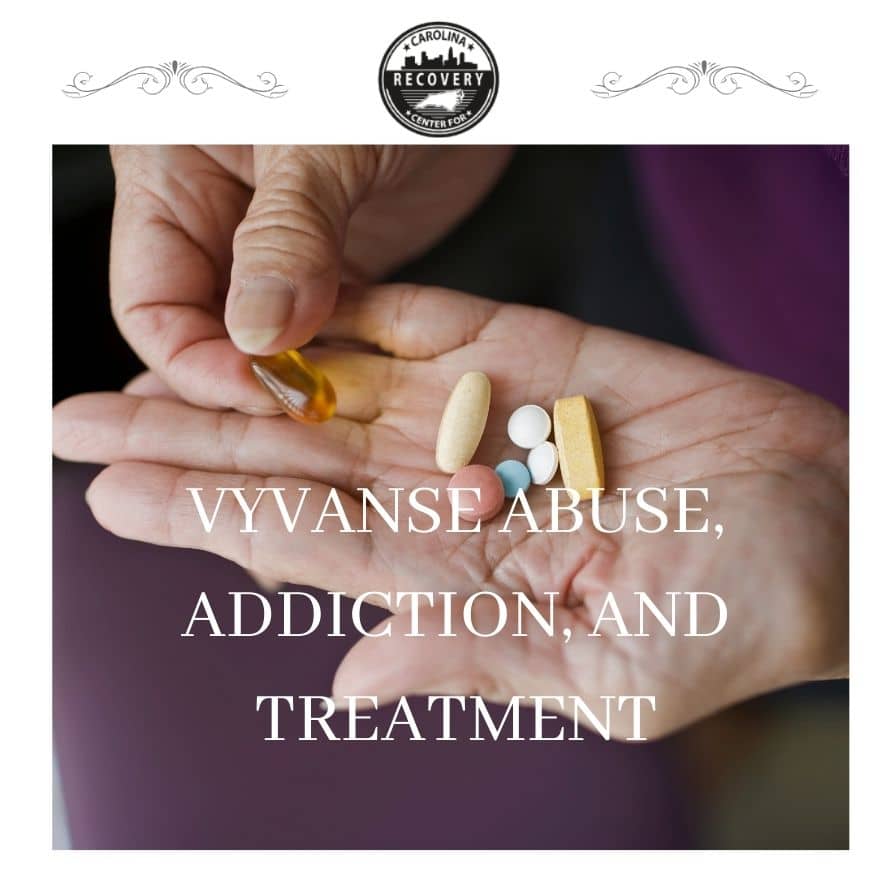Vyvanse Abuse, Addiction, and Treatment

Medically Verified: 2/1/24
Medical Reviewer
Chief Editor

All of the information on this page has been reviewed and verified by a certified addiction professional.
Vyvanse is a prescription medication used to treat certain medical conditions, including attention deficit hyperactivity disorder (ADHD). While many people believe that all prescription medications are always safe to use, some drugs, including Vyvanse, can potentially cause addiction and other severe complications.
Vyvanse abuse and addiction can significantly change a person’s behaviors, mood, and appearance. Knowing the signs of Vyvanse abuse can help you seek treatment as soon as possible.
If you or someone you love lives with Vyvanse addiction, contact the Carolina Center for Recovery specialists to explore your treatment options and find support.
What is Vyvanse (lisdexamfetamine)?
Vyvanse is the brand name for lisdexamfetamine, which is a prescription stimulant drug used to treat attention deficit hyperactivity disorder (ADHD) and binge eating disorder. Many stimulant medications, including Vyvanse, pose the risk of abuse and addiction.
The Drug Enforcement Agency (DEA) classifies Vyvanse as a Schedule II drug, meaning it has a high psychological and physical dependence risk. Some people may begin taking Vyvanse under medical supervision and later misuse it, leading to addiction. Others may take Vyvanse recreationally–meaning without a prescription–which has a high risk of developing dependence.
Recognizing Vyvanse Abuse
Vyvanse stimulates activity in the central nervous system (CNS). When taken as prescribed, there is little risk of health complications or severe side effects. But Vyvanse abuse may lead to uncomfortable or dangerous side effects, including:
- Increased blood pressure
- Rapid heartbeat
- Insomnia
- Decreased appetite and weight loss
- Fatigue
Overdose is also a risk of Vyvanse abuse and can lead to hallucinations, agitation, and seizures. An overdose is a medical emergency. Call 911 at the first sign of an overdose.
People who abuse Vyvanse may experience the stimulant effects of the drug, followed by a “crash.” Symptoms of a crash include:
- Agitation
- Depression
- Lethargy
- Drowsiness
- Increased appetite
- Muscle aches
People may take higher or more frequent doses of Vyvanse to avoid the discomfort of a crash or to achieve the desired effects as their body develops tolerance. Tolerance is a sign of Vyvanse abuse. Without intervention, addiction can develop quickly.
Over time, Vyvanse abuse can lead to insomnia, weight loss, and cardiovascular complications like palpitations, chest pain, and fainting. Life-threatening cardiovascular issues, including heart attack and stroke, may also develop after a prolonged period of Vyvanse abuse.
Do I Need Treatment for Vyvanse Abuse or Addiction?
If you take Vyvanse and have symptoms of abuse, you must seek treatment as quickly as possible to avoid life-altering complications. Recognizing the signs of Vyvanse addiction can help you seek the treatment you need to overcome the condition.
If a person engages in prolonged periods of Vyvanse abuse, they may develop addiction–which often has a profound effect on their behaviors, appearance, and emotions.
Addiction is the complete loss of control over the frequency and nature of your substance abuse. Signs of Vyvanse addiction include:
- Taking Vyvanse without a prescription
- Taking higher or more frequent doses than prescribed
- Trying to stop or reduce your Vyvanse use without success
- Being secretive or lying about your drug use
- Taking risks to get more Vyvanse
- Isolating from friends and family
- Neglecting responsibilities at home, work, or school
- Needing to take more Vyvanse to get the desired results
Misusing Vyvanse can lead to addiction. If you continue to use Vyvanse despite negative consequences in your health, relationships, or other aspects of your life, you may need help to overcome Vyvanse addiction. A comprehensive addiction treatment program can help you regain control over your life and health and move forward.
What Happens in Treatment for Vyvanse Addiction?
Vyvanse addiction treatment is offered in several levels of care, including outpatient, partial, and inpatient rehab programs. The level of care you require depends on the severity of your addiction and other personal factors. Before beginning treatment, a doctor or addiction specialist will assess your needs and recommend the appropriate course of treatment.
Generally, addiction treatment happens in stages, beginning with a medically-supported detox program. During detox, you will receive medications, holistic therapies, and emotional support to help you manage withdrawal symptoms.
After a complete detox, you will begin a comprehensive treatment program that combines evidence-based and holistic therapies to address your addiction’s physical, behavioral, and emotional components.
Treatment plans may include:
- Individual counseling
- Group therapy
- Family therapy
- Medications
- Mental health and medical treatment
- Education about relapse prevention
- Holistic treatments like mindfulness, massage, exercise, and nutrition counseling
- Aftercare planning
The support, skills, and treatment you receive during a Vyvanse addiction treatment program can help you stay sober for the rest of your life.
Find Help Now
You do not have to carry the weight of Vyvanse addiction alone. Compassionate, comprehensive treatment is available at the Carolina Center for Recovery. Our admissions team is ready to help you explore your treatment options, choose the right level of care, and start a life-changing program as soon as possible.
Don’t wait another day for the treatment and support you need to live the healthy, sober lifestyle you want. Call today to begin your recovery journey.
References:

